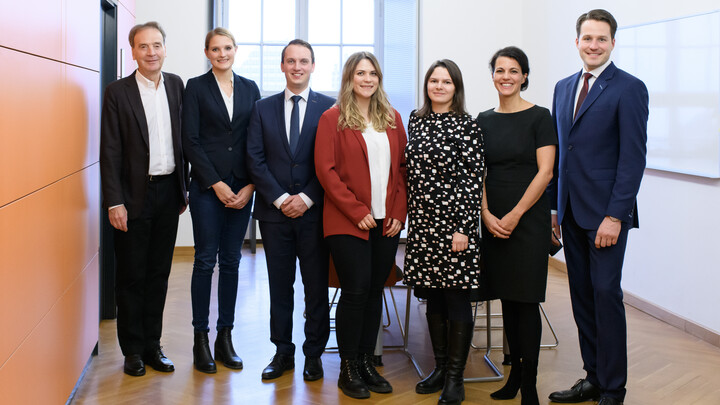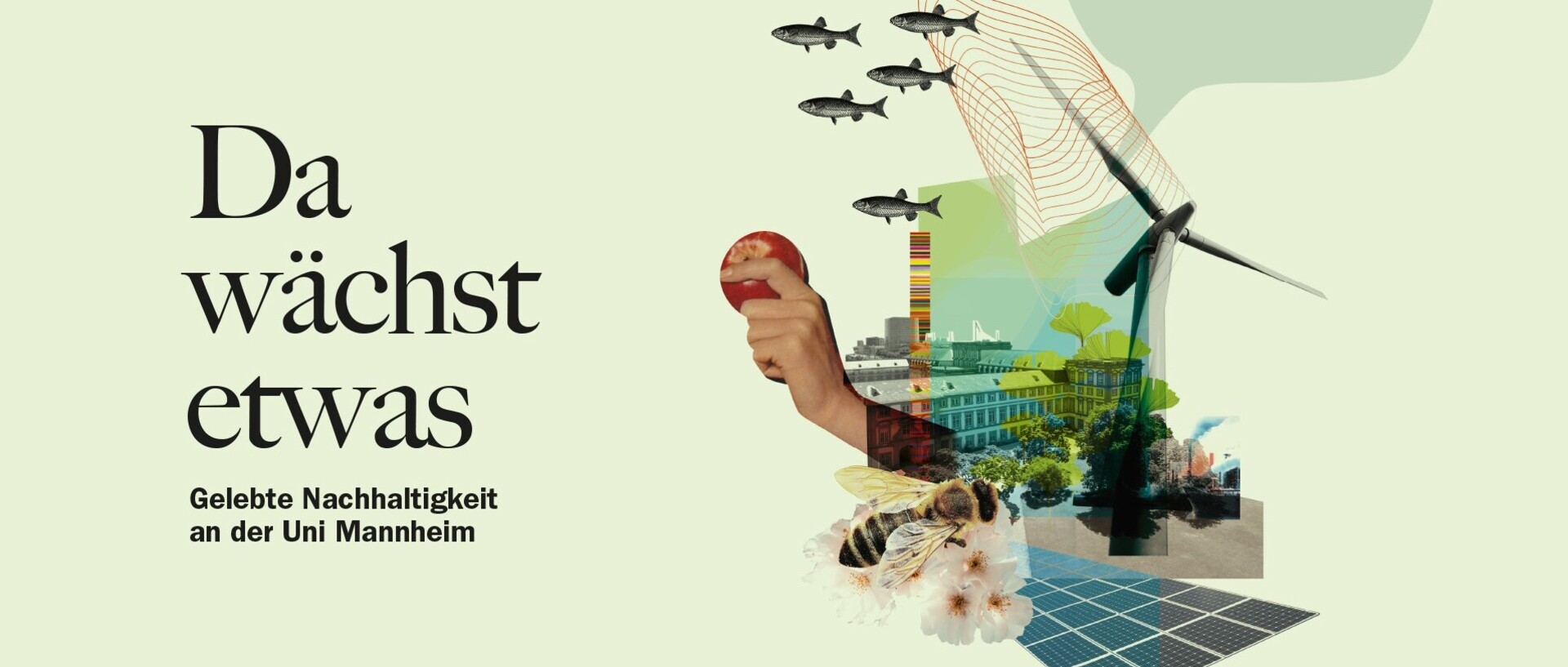An Institute for Sustainability
CO2 – a molecule everyone is talking about. The global community must significantly reduce its carbon footprint in the future and stop fossil fuel extraction to control global warming. Clean energy solutions are necessary, decarbonization is coming. However: How expensive will the energy transition be for the world’s economies? At the Mannheim Institute for Sustainable Energy Studies (MISES), the team led by Prof. Stefan Reichelstein, Ph.D., addresses precisely this question.

Walking past the statues of the Mannheimer Antikensaal, climbing up the hidden, steeply winding wooden staircase, we finally reach MISES at the very top of the east tower of the baroque palace. The heart of the institute is a bright common room with a view of the city center. Here, researchers regularly meet at the conference table. This is not surprising: The high ceilings give space to think, plan and calculate. What is now an institute with eight employees started small and on the initiative of Professor Stefan Reichelstein. After 30 years of research and teaching in the United States, the economist, who then worked at Stanford University, accepted the offer from Mannheim with a clear goal in mind: “The offer from Mannheim was made possible by a donation to the University of Mannheim Foundation. The donor wanted the funds to be used to build a pioneering institute.”
In 2018, Stefan Reichelstein delivered his inaugural lecture and started building MISES with a small team. As a business economist and microeconomist, Reichelstein spent many years working in the field of controlling. He did not address the issue of energy transition until later in his career. “I came across the topic because I was both interested and troubled by the fact that there was no consensus whatsoever on how expensive the energy transition would actually be. “I then became increasingly preoccupied with this question, and now it’s my main area of research,” says Reichelstein.
Institute manager Stefanie Burgahn and junior professor Dr. Gunther Glenk have also been involved from the beginning. Glenk studied Business Administration at the Technical University of Munich. In the fall of 2015, he wrote his master's thesis on the competitiveness of renewable hydrogen and decided to send an email to the Stanford professor. “I had heard about Mr. Reichelstein’s research and found it very exciting. I simply asked him, if he would like to discuss the topic of hydrogen with me sometime,” the 30-year-old recounts. What followed were an invitation to Stanford, joint projects, and eventually, a collaboration at MISES. Glenk looks out the window and his eyes wander over the city. Does he feel he can make a difference from this ivory tower? “Our goal at the institute is clear: We want to speed up the process of decarbonization with our work. CO2 emissions must be reduced quickly. That’s why it’s important for us to work with companies to develop feasible concepts in a timely manner. This means that we don’t stay in the ivory tower,” he says.
The research team works with companies to develop solutions and models that can serve as a blueprint for other companies or governments. A good example is the topic that doctoral student Rebecca Meier is currently focusing on: the decarbonization of the cement industry. “It is particularly difficult for companies to reduce CO2 emissions from cement production because CO2 is a byproduct of cement manufacturing. We are now working with a European company to develop cost-effective approaches to decarbonization,” says Rebecca Meier. These calculations can have significant effects on the global cement production and its carbon dioxide emissions which, in turn, are responsible for a large share of global emissions: Eight percent of global CO2 emissions come from cement production, an amount that is four times more than all CO2 Germany emits in year. “When I started my doctoral project I wondered: Can I make a difference with my research? I don’t want the study to just be swept aside. I want it to contribute to a successful energy transition,” Rebecca Meier says. Her first work was well-received, and so her doubts vanished. Using Theodore Paul Wright's learning curve concept, which has proven successful in many industries, she found that the cost of clean energy sources and storage, such as solar photovoltaic modules, batteries, or renewable hydrogen, is decreasing much faster than previously thought. Each system installed not only directly reduces CO2 emissions, but also provides learning experiences that lead to future cost reductions. This sends an important signal to politicians and underlines the importance of subsidies.
When Stefan Reichelstein talks about decarbonization, he sometimes calls it a difficult transition. However, the CO2 pricing in Europe is a good incentive that is now having an effect, he says. With the energy transition now accelerating, he clearly feels the support at MISES: „We managed to win several external funding and research projects. Therefore, I am now in the position of having to decide which topics we can actually work on in the coming years.” What will MISES be researching in 2030? Stefan Reichelstein already has an idea: “Circular Carbon Economy” – the circular economy of the future. The aim is to implement a recycling system using CO2, renewable electricity and hydrogen. The various molecules will be recycled and transformed into products that traditionally had been obtained from fossil fuels. However, this plan still requires a lot of industry and research innovations – a strong motivation for Stefan Reichelstein and his team at MISES to continue meeting at the big conference table in the future.
Text: Jule Leger / April 2022
The MISES team is organizing a new “Decarbonization Seminar” in cooperation with Centre for European Economic Research (ZEW). The speakers of the seminar, experts from academia and industry, will report on recent progress and challenges related to the transition towards a decarbonized energy economy. The seminar series takes place via Zoom and is open to everyone interested. You can view the dates for the upcoming talks here: www.uni-mannheim.de/mises/forschung/decarbonization-seminar/
